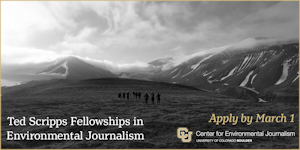Find fellowships, conferences, grants and awards deadlines, workshops and networking opportunities, crowd-sourced leads to job banks, reporting toolkits, hundreds of MOOCs and more. GO >>

Going There
COP15 Accreditation
While most reporters going to Copenhagen have already applied for accreditation and made travel arrangements, press accreditation will remain open through the end of the conference. To register as press, you can not be registered as an NGO or a delegate.
Visa and Passport Information
Denmark does not require a tourist visa for U.S. citizens staying less that 90 days. Make sure your U.S. passport is valid and has extra visa pages. Visa information can be found here, here, and here.
UNFCCC Press Page
The Secretariat of the Framework Convention maintains a press page that includes useful backgrounders and explains many of the fundamentals of the treaty process.
Visit Copenhagen
The official tourism site of Copenhagen and the surrounding area. Offers help planning visits.
The Talks
COP15 Site
The official Web site for the 15th Conference of Parties (COP15) to the UN Framework Convention on Climate Change is run by the Danish government, which is hosting the talks. Surprisingly, it is loaded with actual news and useful information. COP15 on Twitter.
UNFCCC Site
The Web site of the UN Framework Convention on Climate Change, the overarching international climate agreement adopted after the Rio conference of 1992. Ratified by 192 nations, it took effect in 1994. It did not set binding emission limits or deadlines, but set up the mechanisms for ongoing negotiations. Go here for legal and institutional background.
UNEP Climate Change Page
The United Nations Environment Programme is the arm of the UN that handles most environmental matters, and it fosters the UNFCCC. This UNEP site is a good place to find information on how climate change links with other aspects of the environment.
IPCC Reports
The Intergovernmental Panel on Climate Change is the authoritative scientific body when it comes to climate change — compiling the work of hundreds of scientists publishing peer-reviewed research on all aspects of the subjects.
Copenhagen Confidential: For Journalists Only
Twitter Group for Journalists in Copenhagen
Share the scuttlebutt or meet for dinner: @ejgertz/cop15-copenhagen-journos
Copenhagen Connection
If you are going to Copenhagen, whether as a freelancer or on assignment, this SEJ clearinghouse may help you connect with additional stringer assignments — or help media outlets looking for stringers find you.
Climate Change Media Partnership
Climate Change Media Partnership offers expert interviews and other help for journalists covering the Copenhagen talks. CCMP is a joint effort of Internews, Panos, and the International Institute for Environment and Development.
Internews Earth Journalism Awards
Chosen from some 450 applicants, 15 journalists are being sent to Copenhagen as finalists in the Earth Journalism Awards — sponsored by Internews. Ten will be selected for awards.
Fresh Air Center
Not JUST for journalists, actually. But it could serve as a center of operations for the many legitimate media likely to be denied COP15 credentials. Run by the activist group tcktcktck, the Fresh Air Center will maintain twin facilities, one inside the security perimeter and one outside. They describe it as a "rapid response digital media hub in Copenhagen for top global bloggers and digital campaigners."
Background on Climate Diplomacy and Politics
Recent Special Reports
- "Special Report: The Consequences of Copenhagen," The Daily Climate, November 10-13, 2009, by Douglas Fischer.
- "Carbon Watch: Tracking the New Currencies of Global Warming," a joint project of the Center for Investigative Reporting and Frontline/WORLD, beginning November 5, 2009, ongoing.
- "Toward a Stalemate in Copenhagen," Center for Public Integrity/International Consortium of Investigative Journalists, November 4, 2009.
- Special Online Section: "The Climate Agenda," Washington Post.
- Special Online Section: "Countdown to Copenhagen," The Guardian
- A Gristy Guide to the COP15 Climate Talks, Grist.
NGOs: Non-Governmental Organizations
Copenhagen Climate Council
The Copenhagen Climate Council is a collaboration of business leaders, scientists, and policy-makers, founded by the independent think tank Monday Morning. It promotes dialogue between government and business in search of practical solutions.
Copenhagen Climate Summit for Mayors
The Climate Summit for Mayors will meet December 14-17, 2009, in Copenhagen. It emphasizes action by cities.
Climate Action Network
The Climate Action Network (CAN) is one of the largest and most important coalitions of environmentalist groups organized globally around the issue of climate change. About 500 groups affiliate with CAN.
tcktcktck
Tcktcktck is as much a brand as an organization. It goes beyond the traditional environmental groups to include faith-based groups, youth groups, trade unions, and individuals — and uses an innovative "open" organizing model that allows collaboraters to synergize simply by adopting the brand.
WWF
WWF (formerly known as Worldwide Fund for Nature) is one of the largest and richest environmental groups focused on the climate issue.
Greenpeace International
Greenpeace is one of the key international environmental groups focused on climate. It is actually a collection of national Greenpeace groups. They have a penchant for publicity and relate well to media.
World Resources Institute
WRI is really a think tank rather than an environmental group. Centrist, science-based, non-ideological, and non-partisan, they are good at setting hot issues like climate in a broader perspective of human needs.
Following the Talks from Home
The Daily Climate
TDC is a nicely packaged news aggregation by the folks who brought you Environmental Health News — with some original reporting. It will be one good place to get a sweeping view of all the coverage from general media. It comes out daily in the morning — but prepare for the Copenhagen-US time lag. Free online.
ClimateWire
This very high-quality news service is subscription-only. But you can see headlines and story capsules from outside the paywall. You might even try getting a free trial subscription for the duration of COP15. ClimateWire is written in plain English for an audience of professionals. With some time-lag, some ClimateWire articles are republished on this page of The New York Times.
Earth Negotiations Bulletin
ENB has been covering the full range of United Nations environmental negotiations for decades. It is done under auspices of the International Institute for Sustainable Development. The reporting is thorough, objective, and professional — but tends to go deeply into technical and diplomatic detail. Free online.
Reuters
As a global news agency focused especially on the business fallout of international issues, Reuters has been covering the climate negotiations more heavily than most other news organizations. They have a substantial and far-flung team of correspondents writing about climate. Almost all of this content is free online. The best places to find it are here and here.
SciDev.Net's Copenhagen Blog
SciDev.Net's developing world reporters are blogging live from the climate negotiations, led by T.V. Padma, the group's South Asia Regional Coordinator.
Agence France-Press (AFP)
AFP covers the climate negotiations heavily and well. And not through the provincial blinders of the US. Most of their climate coverage is available free online on the TerraDaily site, along with lots of other environmental news, some of it from non-AFP sources.
The National Nexus
U.S. State Department (Climate Change Page)
The State Department also has a special Web page devoted to COP15. That site includes a Press Room which will offer releases and briefing schedules. There is also something called the U.S. Center, an actual physical space at the Bella Conference Center in Copenhagen, which will include information displays and meeting space.
Todd Stern's Facebook Page (Seriously!)
The U.S. State Department has actually opened a Facebook page devoted to COP15.
Group of 77 (G77)
The G77 is an intergovernmental alliance of developing nations formed within the context of the United Nations in 1964, long before the climate issue was on the radar. Today, it also functions as an effective voice for expressing the shared interests of developing nations on climate.
Alliance of Small Island States (AOSIS)
Some small island nations, like the Maldives, Tuvalu, or Vanuatu will be partly or wholly submerged by the sea-level rise that will accompany global warming. All of the 40-plus states taking part in AOSIS feel a special urgency in slowing climate change because of the greater impacts it will have on them.
Annex I States (Industrialized Countries)
text
China Climate Change Info-Net
Now the biggest carbon dioxide emitter in the world, China is key to any effective post-Kyoto climate agreement.
Coalition for Rainforest Nations
This coalition consists of about 15 developing nations with significant amounts of tropical rainforest. Such nations might benefit from the sale of carbon offsets.
Organization of Petroleum Exporting Countries (OPEC)
OPEC and other oil-exporting nations have tended to oppose efforts to reduce the growth of consumption of petroleum fuels.













 Advertisement
Advertisement 




